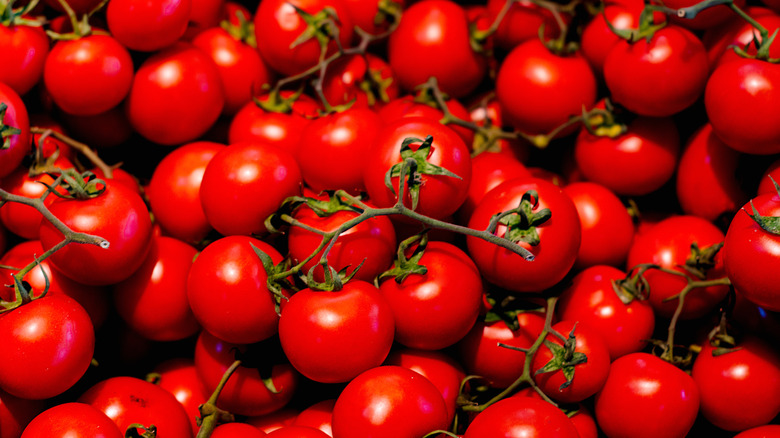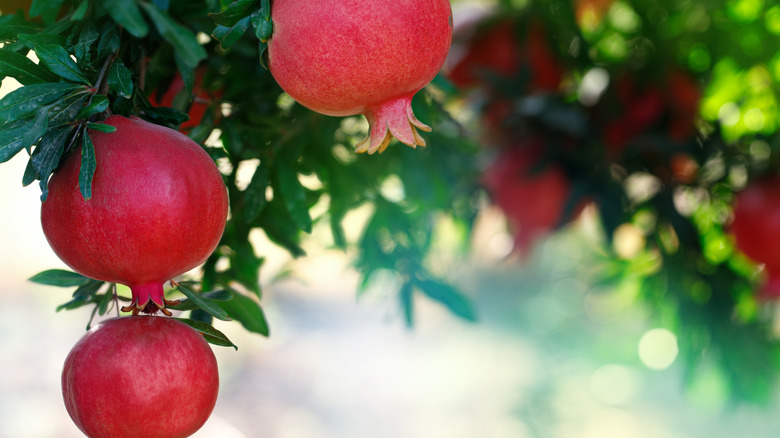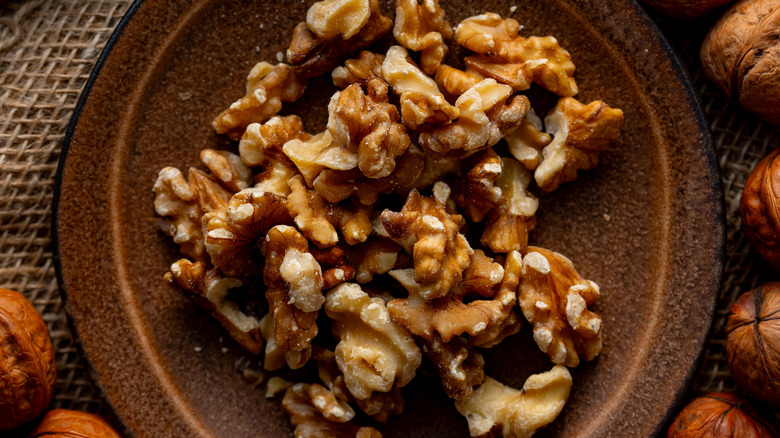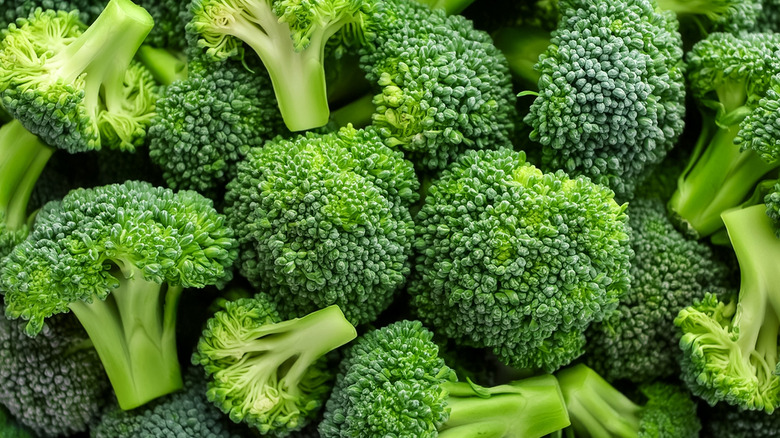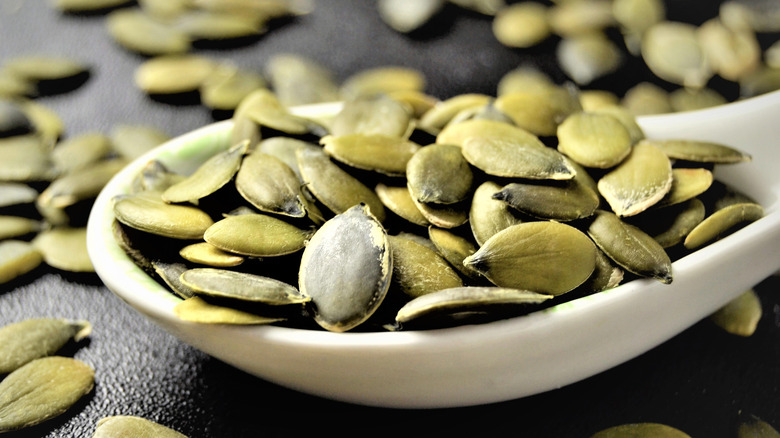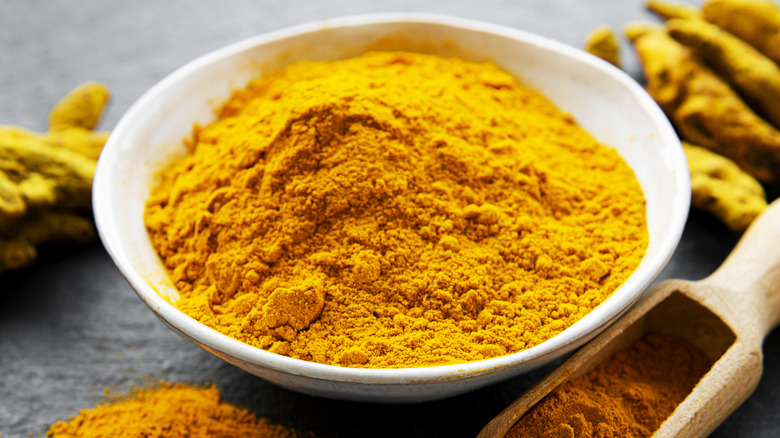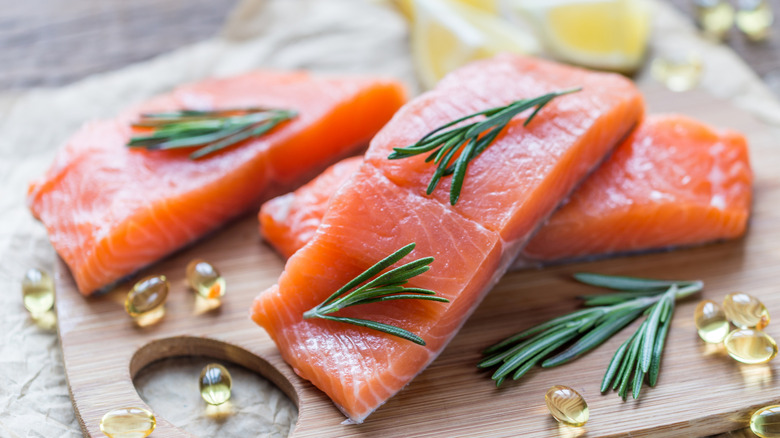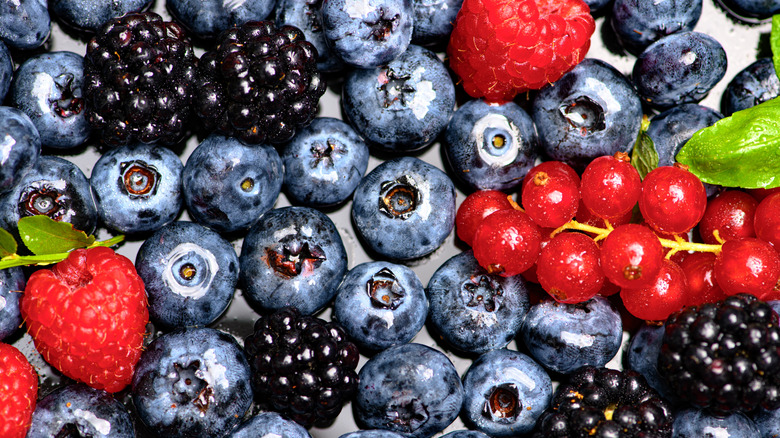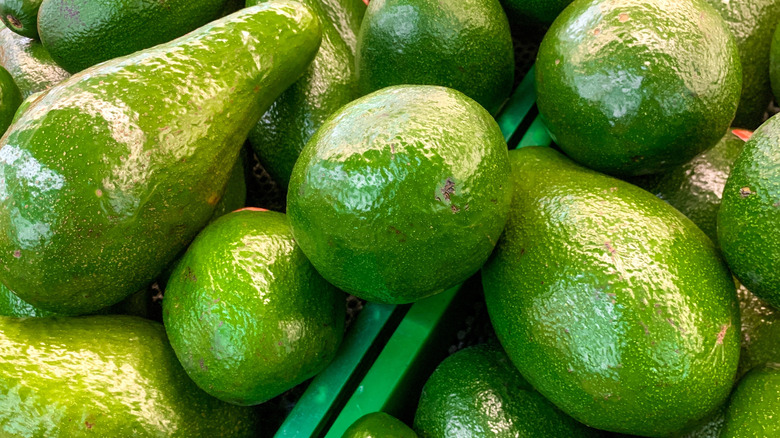These 9 Foods Have An Unexpected Effect On Your Prostate Health
For men, taking care of the prostate is of paramount importance. It is a gland that you may not think of often, particularly if you're young. However, the prostate's location in the body — below the bladder and in front of the rectum — means that prostate problems could spell big problems below the waist. For starters, its placement means that inflammation or infection could impact everything from urination to sexual performance.
Diet can play a significant role in prostate health, particularly when it comes to an enlarged prostate, or benign prostatic hyperplasia (BPH). A low-fat diet, eating regular servings of fruits and vegetables every day, and limiting your caffeine and alcohol intake can all help manage the symptoms of BPH. Supplements such as saw palmetto and lycopene could help as well, but it's a good idea to talk to your doctor first. With that said, if you're looking to give your prostate a boost, adding these foods to your diet definitely can't hurt.
Tomatoes
According to a 2022 study published in Biomedicine & Pharmacology, tomatoes are rich in lycopene, a natural compound that has been found to be safe and non-toxic. It may also have the potential to prevent or slow down prostate cancer. Per the study, lycopene has a "potential inhibitory effect" on prostate cancer cells, possibly being able to stop their growth and even causing them to die.
Interestingly, how tomatoes are prepared could play a role in their efficacy against prostate cancer. The World Cancer Research Fund found that men who had canned or cooked tomatoes anywhere from five to six times a week saw their risk of developing prostate cancer decrease by 28%, as opposed to men who did not have tomatoes as a staple of their diet. It would appear that lycopene is more easily absorbed by the body when tomatoes are heated, as the process of cooking helps release lycopene from the proteins that bind to it.
Pomegranate
Pomegranates are high in polyphenols, chemical compounds that have an anti-inflammatory effect on the body's cells. These polyphenols can help slow the growth of bad gut bacteria and improve skin health. They have also shown to have the ability to benefit the heart, urinary health, and even memory. In addition, polyphenols have a number of nutrients that may be beneficial in fighting cancer.
According to a 2015 study published in Oxidative Memory and Cellular Longevity, pomegranates appear to have the ability to affect different proteins in the body to slow down and even stop cancer growth. Prostate cancer is dependent on androgens like testosterone in order to progress, and pomegranates reduce the production of these androgens. In mice, pomegranates have been shown to have the ability to inhibit the growth of cancer cells and delay the formation of tumors. They also limit the formation of blood vessels needed by these tumors to grow. All of these properties help identify pomegranates as a potentially valuable ally in the battle against prostate cancer.
Green tea
Green tea is a polyphenol-rich beverage that may help play a role in combating BPH. It seems that the prostate has the ability to absorb polyphenols more easily, which points to the potential benefits polyphenols may have in shrinking BPH-affected prostates. While more research is still needed, there is evidence to suggest that green tea, when combined with other elements such as lifestyle changes and medication, may be a useful tool when it comes to combating BPH.
A 2015 study published in Cancer Prevention Research further illustrated the anti-cancer properties of green tea. The key may be in one particular compound present in green tea extract known as epigallocatechin gallate, or EGCG. In the study, metastatic cells treated with EGCG experienced cell death, while non-tumor cells remained unaffected. According to the study, EGCG has the ability to both slow the growth of cancer cells and possibly trigger their self-destruction.
Walnuts
A 2008 study published in Nutrition Journal showed that walnuts are high in a type of vitamin E known as tocopherols. The study found that after eight weeks of eating walnuts, there was an increase in gamma-tocopherol in the blood. Additionally, the ratio of free prostate-specific antigen (PSA) to total PSA showed a trend towards improvement. Free PSA are antigens that float freely in the blood, while total PSA is the amount of antigens that both float freely and are bound to proteins in the blood. A lower number of free PSA compared to total PSA could be a sign of prostate cancer.
According to a 2013 study published in Cancer Investigation, a walnut-rich diet helped to reduce the growth of a certain human prostate cancer xenograft known as LNCaP in mice. The study showed that the xenografts in the mice who ate walnuts grew more slowly than the mice in the control group. In fact, the tumor size in the walnut-fed mice was one-fourth the size of the tumors in the control group at the end of the study.
Broccoli
Cruciferous vegetables like broccoli, cauliflower, and Brussels sprouts are abundant in such nutrients as sulforaphane and indole-3-carbinol, which have the capacity to produce antioxidant enzymes that can protect the body's cells from damage from carcinogens. They are also able to kill damaged cells and stop the growth and further spread of harmful cells. A 2023 study published in the International Journal of Molecular Sciences showed that 40% to 60% of prostate cancer cells treated with sulforaphane for 72 hours saw their growth slow or die entirely.
According to a study conducted by Oregon State University, sulforaphane has the ability to selectively target cancer cells. The study specifically looked at women with abnormal mammogram results. Women in the study either received a placebo or sulforaphane supplements equivalent to one cup of broccoli daily. The women who received the supplements demonstrated a decrease in the markers of cell growth, which indicated that these compounds could help to slow the growth of cancer cells and could even possibly help to shrink existing tumors.
Pumpkin seeds
Pumpkin seeds' high zinc content can help improve and maintain prostate health, as the prostate requires zinc to function optimally. Additionally, the seeds contain a compound called phytosterol, which could be helpful in the reduction of prostate enlargement. Moreover, they can also help to level out hormone levels, which could be beneficial in the management and treatment of BPH.
A 2015 study conducted by the German Research Activities on Natural Urologicals examined more than 1,400 men with BPH, breaking them into two groups. One group was given pumpkin seed, and the second was given either capsules with pumpkin seed extract or a placebo. The researchers noted that after a year, nearly 60% of the men who took the pumpkin seed responded positively versus those who took the placebo. Overall, the men with BPH who took pumpkin seed over a 12-month period saw a meaningful improvement in their symptoms.
Turmeric
An Asian spice, turmeric has been touted as a possible remedy for everything from digestive issues to respiratory infections and even depression. In addition, turmeric may have properties that can help combat, and possibly prevent, prostate cancer. One of the active ingredients in turmeric is curcumin, an antioxidant that may have the ability to shrink tumors in the prostate or possibly stop their growth.
According to a 2015 study in the Korean Journal of Urology, curcumin lowers levels of androgen receptors, which are linked to tumor growth, and prevents them from activating genes that promote the progression of cancer. This may help stop tumors from becoming more aggressive and resistant to treatment. In addition, curcumin can block signals that encourage cancer cells to multiply and spread. It can interfere with the cell cycle, stopping cancer cells from dividing and triggering their self-destruction. It also can zero in on cancer stem cells, which play a key role in the growth of tumors and their resistance to treatment.
Fatty fish
Researchers of a 2024 study published in the Journal of Clinical Oncology found that a diet that is low in omega-6 and omega-3 fatty acids, along with fish oil supplements, helped reduce the growth of prostate cancer cells in men who were in the early stages. The study specifically looked at a biomarker called the Ki-67 index. This biomarker shows how fast cancer cells are multiplying, and according to the study, men with a diet high in omega-3 fatty acids saw their Ki-67 decrease by 15%.
The omega-3 fatty acids found in fish like salmon have the ability to reduce inflammation. And, while there is no direct evidence that these fatty acids can prevent prostate cancer, there is ample evidence to show that omega-3 fatty acids can reduce one's risk of death from prostate cancer. However, on the other side of the coin, a 2013 study published in the Journal of the National Cancer Institute revealed a link between high levels of omega-3 fats in the blood and prostate cancer.
Berries
Berries such as strawberries and blackberries are a great source of antioxidants, which help fight off free radicals. Free radicals can attack the body's healthy cells and, in some cases, increase one's risk of cancer. They are also loaded with vitamin C, which can help with BPH. A 2015 study published in the Journal of Cancer found that the more vitamin C men added to their diet, the lower their risk of prostate cancer became. Specifically, for every 150 milligrams of vitamin C consumed every day, the risk dropped by 9%.
The National Foundation for Cancer Research specifically pointed to blueberries as a powerful ally in combating cancer. Blueberries contain anthocyanosides and resveratrol, which are strong antioxidants with detoxifying and anti-inflammatory properties. Additionally, for patients who are undergoing cancer treatment, blueberries have been shown to improve the efficacy of radiation treatment and to reduce abnormal cell growth as well.
Avocados
Avocados are packed with a compound called beta-sitosterol, which can help to ease the symptoms of people suffering from an enlarged prostate. A 2005 study published in the Journal of Nutritional Biochemistry showed that avocados were rich in lutein, as well as carotenoids and vitamin E. In particular, avocados have been shown to be the highest fruit source of lutein among the most commonly consumed fruits. In the study, an extract from avocados was shown to inhibit the growth of prostate cancer cells up to 60%.
Avocados are often mentioned as having a high content of so-called "good fats," which can be beneficial in lowering cholesterol and preventing heart disease. These good fats make it easier for the body to absorb the vitamins and nutrients it needs. A study published by Ohio State University showed that eating carrots or tomatoes with avocado significantly boosts the body's ability to produce vitamin A—12 times more from carrots and four times more from tomatoes.

